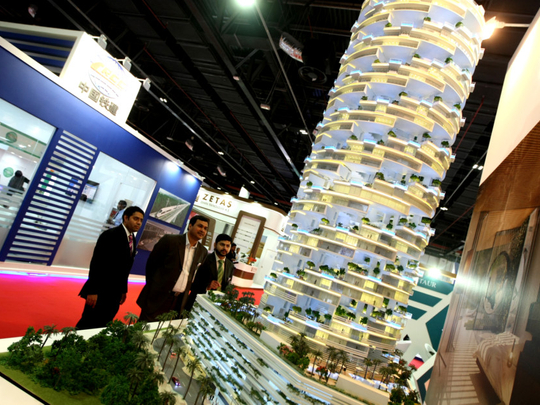
Dubai: Knowledge and innovation are the key blocks in building the UAE’s green economy, said Saeed Al Tayer, managing director and chief executive officer of Dubai Electricity and Water Authority (Dewa).
Under Vision 2021, the UAE is on a fast track to develop a knowledge-led economy, investing in its human capital and the potential to develop a competitive advantage in specific sectors.
By 2021, the UAE’s ambition is to have the knowledge sector contributing up to five per cent of the country’s GDP (Gross Domestic Product).
“This can be done through innovation and investment in science and technology,” Al Tayer said. He was speaking at the closing day of Water, Energy, Technology and Environment Exhibition (Wetex) on Thursday.
“Through investment in research and technology that alternative sources of energy can be initiated and patterns of the ecosystem can be adequately anticipated,” he added.
According to Al Tayer, in the UAE, Dubai is building on its position as a global hub for trade, finance and tourism to make the transition to a green economy.
Dubai’s plan to build a knowledge based economic model was clearly demonstrated in early 2012, when the national initiative of “Green Economy for Sustainable Development” was launched by His Highness Shaikh Mohammad Bin Rashid Al Maktoum, Vice-President and Prime Minister of the UAE and Ruler of Dubai.
The Green Economy initiative is transforming the UAE into a leader in sustainability and a competitive centre for the export and re-export of green technologies and products.
The operation introduces a plethora of programmes and polices spanning various sectors including energy, agriculture, investment and sustainable transport and which are set to further improve standard of living in the country.
Human capital
Moreover, Waleed Salman, Executive Vice President for Strategy and Business Development at Dewa and Chairman of Dubai Carbon Centre of Excellence, said: “The Federal government has made numerous commitments to strengthen the UAE’s macroeconomic foundations while reforming its regulatory environment and investing heavily in human capital.”
Currently, the government is investing a lot on developing UAE nationals and resident who are qualified an experienced in planning, developing and enhancing the nation’s energy sector.
Citing an example, Salman said that Dewa has allocated Dh150 million to develop the research and development (R & D) which will benefit the existing and future energy projects.
Beyond being a pioneering project in solar-power generation, Dewa is developing a research, development and innovation Centre inside Mohammad Bin Rashid Al Maktoum Solar Park, Salman said.
This centre, dedicated to scaling renewable-energy technologies and energy efficiency practices, is set to open in 2017, and will also serve as an academy for renewable energy, he added.
“Abu Dhabi’s Masdar Institute of Science and Technology, in its fifth year, is a beacon for research and development in renewable energy and sustainable industries in the UAE,” Salman said.
He also said that the recently launched UAE’s Carbon Ambassador Programme builds capacity and more importantly is generating interest among university students to pursue careers in the green economy.
Since its inception, around 40 students have completed a group project, such as redeveloping a discarded shipping container as a sustainable bus shelter, as well as undergo a number of training modules, representing the UAE at national and international conferences, Salman said.












